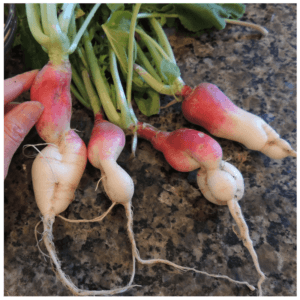
Radishes can have a radical effect on your health! Here are just some of the reasons we love them:
1. Radishes are members of the cruciferous (or Brassica) family and like other members of the family, they support the pathways of detoxification. They stimulate both Phase 1 and Phase 2 of the detox process. Phase 2 has 6 detoxification pathways, one of which is called the sulfation pathway. This pathway depends on sulfur compounds to attach and neutralize certain toxins, and cruciferous vegetables are rich in sulfur. They contain high amounts of sulforaphane, indole 3-carbinol and crambene, and other phytonutrients important to detoxification. Sulforaphane is essential for the good health of the liver, and actually all cells of the body. Sulfur compounds also provide a flexible bond between proteins in the cells. Without sulfur, new cells would be rigid, resulting in inflammation. They’s why MSM (a sulfur compound) works for many people with joint pain. Indole 3-carbinol and crambene work synergistically with sulforaphane to maximize their beneficial qualities. All 3 stimulate detoxification enzymes, but they are even more powerful when combined. Cruciferous vegetables also provide a wide range of antioxidants that protect the liver from free radical damage. A study funded by the National Cancer Institute showed that people who ate 1-2 cups of cruciferous vegetables each day had 22% less oxidative stress than those who did not! Now, you might not want to eat 1-2 cups of radishes, but you can add them to a cabbage slaw for example (another cruciferous vegetable) and easily eat that much.
2. Because radishes, like other cruciferous vegetables support liver health, it’s no surprise that radishes have been used to treat jaundice, a condition where the liver cannot break down bile fast enough, and bilirubin builds up in the bloodstream. Radical radishes are one of the best vegetables for removing excess bilirubin! It doesn’t stop there either. They not only purify the blood, but they protect it as well, by increasing the level of oxygen in the blood.
3. These amazing vegetables are also high in fiber and water, helping with constipation, removing the toxins entirely out of the body and balancing blood sugar levels (diabetes prevention)!
4. Radishes contain many other nutrients as well. Did you know that radishes have more potassium than bananas? They’re also rich sources of ascorbic acid, Vitamin C (healthy skin and blood vessels), folate (important for pregnant women) and magnesium (heart health).
5. Radishes are a natural diuretic, meaning they increase the production of urine. They also support the kidneys and can reduce the burning sensation sometimes associated with urination. They have been used traditionally to inhibit urinary tract infections. Add them to your diet if you are prone to UTI’s, then see if it helps.
6. Radishes come in many attractive variations including red, rose, purple, black, lavender, and the white Daikon radish used in Asian cuisine. They add a crunchy texture, a spicy kick, and color to salads and slaws with almost no calories. If you’ve never tried one, now is the time!
References:
http://foodfacts.mercola.com/radish.html
http://www.med-health.net/Health-Benefits-Of-Radishes.html

